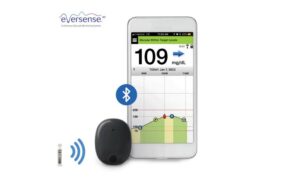
The insertion took place as part of the company’s ENHANCE clinical trial at the AMCR Institute. AMCR, a clinical research center, focuses on pre-diabetes, type 1, type 2 diabetes and obesity. The study operates under the direction of Dr. Timothy Bailey.
Germantown, Maryland-based Senseonics develops the Eversense platform of long-term, implantable continuous glucose monitors (CGMs). The company’s Eversense E3, a 180-day implantable CGM, received FDA approval in February of last year.
Dr. Francine Kaufman, Senseonics CMO, said expanding to a pediatric population represents a “priority” for the company. Positive results could further extend the company’s reach across the global diabetes community, she added.
“The differentiated features of our long-term implantable Eversense system are uniquely suited to benefit pediatrics and enable parents and their children to work together to manage diabetes,” said Kaufman. “Young people would have the ability to remove their transmitters to participate in activities, without having to worry about wasting valuable sensors, and enjoy ring-free vibrating alarms to help manage their sugar levels without attracting unwanted attention to themselves.”
About the Senseonics ENHANCE pivotal trial
Senseonics set up ENHANCE to evaluate the accuracy and safety of Eversense for up to one year.
More than 165 adult subjects received Eversense implants across four U.S. centers. The company completed enrollment for the 365-day sensor configuration in September 2022. Senseonics expects the last patient to complete their 365-day visit during the third quarter of 2023.
The company also intends to utilize study data to submit for an integrated CGM (iCGM) designation in 2023. Senseonics holds an FDA investigational device exemption (IDE) to expand the trial to pediatric patients. These patients — between 14 and 18 years old — first enrolled in the second quarter of 2023.
“I am excited to be one of the investigators in the ENHANCE trial and thrilled to be the first to enroll subjects in the pediatric extension,” said Bailey, head of AMCR Institute in Escondido, California. “In our experience, CGM is an essential tool for all people with diabetes, especially for those who take insulin. We believe having additional accurate, and especially long-term wear, CGM options for our pediatric patients and their families will increase utilization of the technology and improve the quality of their lives.”

